Canada (& the United States) five years later .. five signs of the times on 9/11/06
Sep 10th, 2006 | By L. Frank Bunting | Category: Key Current Issues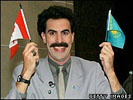 In some ways the September 11, 2001 Al-Qaeda terrorist attacks on New York City and Washington are still very much with us on their fifth anniversary. Take two vaguely contradictory headlines for September 9, 2006, e.g.: “The long march home … The US public wants its troops to leave Iraq, but worries about how to avoid leaving chaos behind”; and: “Afghan mission likely to grow … Canada expected to respond to call for more troops.” If we are too obsessed with all this, the terrorists have won etc. So it’s a good thing that the current government of Canada is also trying to press ahead with some plans for domestic Senate reform. Give the Quebec wing of the federal NDP a star as well for trying to raise the murky future of the British monarchy in Canada at the NDP convention in Quebec City. And don’t forget that there are fresh signs of bumpy economic roads ahead to worry about too.
In some ways the September 11, 2001 Al-Qaeda terrorist attacks on New York City and Washington are still very much with us on their fifth anniversary. Take two vaguely contradictory headlines for September 9, 2006, e.g.: “The long march home … The US public wants its troops to leave Iraq, but worries about how to avoid leaving chaos behind”; and: “Afghan mission likely to grow … Canada expected to respond to call for more troops.” If we are too obsessed with all this, the terrorists have won etc. So it’s a good thing that the current government of Canada is also trying to press ahead with some plans for domestic Senate reform. Give the Quebec wing of the federal NDP a star as well for trying to raise the murky future of the British monarchy in Canada at the NDP convention in Quebec City. And don’t forget that there are fresh signs of bumpy economic roads ahead to worry about too.
1. “The long march home … The US public wants its troops to leave Iraq, but worries about how to avoid leaving chaos behind” …
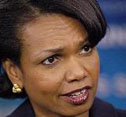 Even those of us who have always thought that the attempted liberating invasion of Iraq was a mistaken and unwise response to the 9/11 terrorist attacks don’t have many good reasons to be happy about the growing public support for this view in the USA today. The big problem for US foreign policy now is how to get out of Iraq without making things worse. And no one, Republican or Democrat, quite seems to have this figured out yet.
Even those of us who have always thought that the attempted liberating invasion of Iraq was a mistaken and unwise response to the 9/11 terrorist attacks don’t have many good reasons to be happy about the growing public support for this view in the USA today. The big problem for US foreign policy now is how to get out of Iraq without making things worse. And no one, Republican or Democrat, quite seems to have this figured out yet.
Even if someone had figured it out, more or less exactly, and even if the Democrats were to do surprisingly well in the upcoming November 7 mid-term elections, George W. Bush is still going to be president for the next two years. Things are apparently changing somewhat in his administration. According to the New York Times, e.g., Dick Cheney is down and Condoleeza Rice is up. But even if someone gave her a workable plan, it seems highly unlikely that the lovely Ms. Rice (who will be spending 9/11/06 in Halifax, Nova Scotia) could push such a thing through, especially if you have been listening to the president himself on TV lately. And earlier reports of the beginnings of US troop withdrawals from Iraq in the near enough future are at the moment still being pronounced quite dead.
 At least Canadians can find it interesting to compare all this with the somewhat parallel syndrome in the old imperial metropolis, as mediated by the parliamentary democratic institutions of the United Kingdom. Here Mr. Bush’s Iraq War co-conspirator, Tony Blair, it now seems, will only be lasting about half as long as Mr. Bush himself. But who now knows just what this might mean for the UK’s continuing staunch support of the currently besieged war to make the Middle East safe for democracy, in the US presidential election year of 2008?
At least Canadians can find it interesting to compare all this with the somewhat parallel syndrome in the old imperial metropolis, as mediated by the parliamentary democratic institutions of the United Kingdom. Here Mr. Bush’s Iraq War co-conspirator, Tony Blair, it now seems, will only be lasting about half as long as Mr. Bush himself. But who now knows just what this might mean for the UK’s continuing staunch support of the currently besieged war to make the Middle East safe for democracy, in the US presidential election year of 2008?
Meanwhile, Mr. Bush is saying that history will be his judge. And it no doubt will, one way or the other. It is always possible to argue that if we just take courage and stay the course for another five years, everything finally will work out as we said it would in the first place. (Considerations of this sort once led to such phenomena as the Hundred Years War in the history of Europe.)
2. “Afghan mission likely to grow … Canada expected to respond to call for more troops”
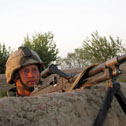 In some ways (though obviously not in others), it could almost be said that the current situation in Afghanistan is almost a kind of test run for US troop withdrawals in Iraq. The US is at any rate supposed to be reducing its troops there, and handing ultimate responsibility over to a more multilateral NATO-led force – in which Canada now has more troops than it used to have in the region, and may well have a few more of again in the quite near future.
In some ways (though obviously not in others), it could almost be said that the current situation in Afghanistan is almost a kind of test run for US troop withdrawals in Iraq. The US is at any rate supposed to be reducing its troops there, and handing ultimate responsibility over to a more multilateral NATO-led force – in which Canada now has more troops than it used to have in the region, and may well have a few more of again in the quite near future.
The current expanded Canadian role in Afghanistan is quickly developing its own domestic critics. Strictly speaking, the new Harper Conservative minority government inherited the policy from the former Martin Liberal minority government. Canada has never been part of the War in Iraq. But it has been part of the mission in Afghanistan from the start – on the argument that this was the original military response to the 9/11 terrorist attacks that actually made sense.
Yet the Harper government has quickly made the recent expanded Canadian role in Afghanistan its own enthusiastically supported policy, and worked to expand it still more.
 Stephen Harper himself has made speeches promoting what some have long seen as a much-needed revival of Canadian military traditions. And he and some of his cabinet ministers have even tried to adapt President Bush’s already tired stay-the-course, support-the-troops, never-cut-and-run rhetoric on Iraq to the new Canadian circumstances in Afghanistan.
Stephen Harper himself has made speeches promoting what some have long seen as a much-needed revival of Canadian military traditions. And he and some of his cabinet ministers have even tried to adapt President Bush’s already tired stay-the-course, support-the-troops, never-cut-and-run rhetoric on Iraq to the new Canadian circumstances in Afghanistan.
The big trouble with Afghanistan, it now seems, is that things there haven’t really worked out all that much better than in Iraq. Osama is still at large somewhere, probably (or perhaps in neighbouring Pakistan). The Taliban have returned. And critics urge that the new NATO-led force is still placing far too much emphasis on the strictly military side of its mission – and alienating the Afghan people of Hamid Karzai’s presumed new democracy in the process.
The expanded Canadian role is still not popular with Canadian voters, and the Harper government’s strong commitment to it could prove a significant liability in the next Canadian federal election. (Meanwhile, President Karzai will be paying a visit to Canada soon.)
3. “Harper warns Senators he’ll get his way”
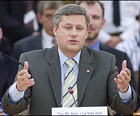 Stephen Harper may have made some big and even politically costly mistakes in his over-ideologically-driven enthusiasm for Canada’s expanded role in Afghanistan. But even if you do not like him much at all, and/or believe that Kraft Dinner probably is all he ever eats (under both of which headings I confess I qualify myself), you have to be impressed by his unprecedented appearance this past week before a Senate of Canada committee studying Senate reform.
Stephen Harper may have made some big and even politically costly mistakes in his over-ideologically-driven enthusiasm for Canada’s expanded role in Afghanistan. But even if you do not like him much at all, and/or believe that Kraft Dinner probably is all he ever eats (under both of which headings I confess I qualify myself), you have to be impressed by his unprecedented appearance this past week before a Senate of Canada committee studying Senate reform.
At the bottom of everything, the key point about Senate reform in Canada runs something like this. Canada, as a country, has been for too long now stuck in the mud. One thing 9/11 has done over the past five years is make this position even more unsustainable than it used to be.
 Some urban sophisticates talk about a need to “re-brand” Canada, but the real problems run a little deeper than this. To make any kind of progress, especially with the failed constitution mongering of the late 1980s and early 1990s still ringing in so many ears, Canada and the Canadian people today have to convince themselves that they actually can pick up all the promising and challenging pieces that have been scattered about over the past half century, and turn them into some kind of real country in its own right that makes sense at last.
Some urban sophisticates talk about a need to “re-brand” Canada, but the real problems run a little deeper than this. To make any kind of progress, especially with the failed constitution mongering of the late 1980s and early 1990s still ringing in so many ears, Canada and the Canadian people today have to convince themselves that they actually can pick up all the promising and challenging pieces that have been scattered about over the past half century, and turn them into some kind of real country in its own right that makes sense at last.
Whatever else, Stephen Harper does seem to have come up with the beginnings of a potentially workable approach to the very longstanding impossible dream of reforming what he has aptly called the 19th century relic of the current Canadian Senate – an absurd quasi-regional colonial homage to the old British House of Lords, and a monumental embarrassment to the rising Canadian democracy for the past 100 years.
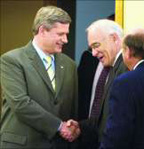 If he can finally bring off what he has in mind – reducing the current Senatorial term to some reasonable period of several years (six, eight, or nine?), and then holding elections for any subsequent Senate appointments he might himself make as a prime minister in the near future, or something like that (and all without stumbling, for the time being, into the morass of the current Canadian constitutional amending formula that requires approval by seven provinces with 50% of the population, etc) – Prime Minister Harper will have very creatively opened some doors to a new and more confident era of gradual reform and revitalization of Canadian institutions for the 21st century, that Canada as a country really does (almost desperately) need.
If he can finally bring off what he has in mind – reducing the current Senatorial term to some reasonable period of several years (six, eight, or nine?), and then holding elections for any subsequent Senate appointments he might himself make as a prime minister in the near future, or something like that (and all without stumbling, for the time being, into the morass of the current Canadian constitutional amending formula that requires approval by seven provinces with 50% of the population, etc) – Prime Minister Harper will have very creatively opened some doors to a new and more confident era of gradual reform and revitalization of Canadian institutions for the 21st century, that Canada as a country really does (almost desperately) need.
As always happens in such cases, there are those who do not welcome any such changes, for various good and bad reasons. And they are already carping, and complaining, and resisting.
 But if Stephen Harper can manage to bring off the kind of “step-by-step” beginnings to Senate reform that he is talking about, he really will have struck a strong blow for the future of Canada (and Quebec, the aboriginal peoples, the new multicultural society, all the various indigenous business communities, resource economies, stock markets, labour unions, religious and community organizations, sexual orientations, occupations, farms, villages, towns, and cities, and everyone and everything else that makes its home in the country today).
But if Stephen Harper can manage to bring off the kind of “step-by-step” beginnings to Senate reform that he is talking about, he really will have struck a strong blow for the future of Canada (and Quebec, the aboriginal peoples, the new multicultural society, all the various indigenous business communities, resource economies, stock markets, labour unions, religious and community organizations, sexual orientations, occupations, farms, villages, towns, and cities, and everyone and everything else that makes its home in the country today).
He knows this at least. He is in a few ways a political intellectual slightly like Pierre Trudeau – sort of, albeit one who only eats Kraft Dinner, and has been most profoundly shaped by the boring old middle-class suburb of Leaside in Toronto and the wide open spaces of Calgary Southwest. And that’s what finally made his unprecedented and willful performance in the Senate of Canada this week look good (at least even to people like me, who also think he is profoundly mistaken about Afghanistan and almost everything else, and would never dream of actually voting for him in the end).
4. “Eyes left as NDP gathers in Quebec City”
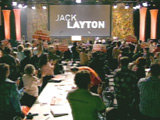 The big Canadian headlines from the federal New Democratic Party convention in Quebec City, over the weekend just before September 11, 2006, all turn around the overwhelming support of party activists for leader Jack Layton’s call to get Canada out of its current extended and over-militarized mission in southern Afghanistan by early next year.
The big Canadian headlines from the federal New Democratic Party convention in Quebec City, over the weekend just before September 11, 2006, all turn around the overwhelming support of party activists for leader Jack Layton’s call to get Canada out of its current extended and over-militarized mission in southern Afghanistan by early next year.
Some would say that if the Harper Conservatives place too much weight on the need for military might in the troubled early 21st century, the Layton New Democrats place too little. (And neither really comes to grips with the need to re-think what the best military role is nowadays, and how it often relates to the kind of disaster management that Hurricane Katrina showed the Bush administration in Washington has yet to master too. But that’s another story for another day.)
Yet the NDP convention in Quebec City also at least briefly contemplated another nobler Canadian domestic high policy objective, that vaguely parallels Stephen Harper’s Senate reform – and actually made some progress on another vaguely related front as well.
 Under the headline “NDP to support Canuck republic?,” the September 6 Ottawa Sun published a Canadian Press report that “Quebec members of the NDP hope to win the hearts of francophones by proposing that Canada become a republic and by adopting a conciliatory tone with sovereigntists … They are two resolutions that will be put forward at the … New Democratic convention … in Quebec City … The motion that risks being most controversial would see the NDP lead an active campaign to remove Queen Elizabeth as head of state.”
Under the headline “NDP to support Canuck republic?,” the September 6 Ottawa Sun published a Canadian Press report that “Quebec members of the NDP hope to win the hearts of francophones by proposing that Canada become a republic and by adopting a conciliatory tone with sovereigntists … They are two resolutions that will be put forward at the … New Democratic convention … in Quebec City … The motion that risks being most controversial would see the NDP lead an active campaign to remove Queen Elizabeth as head of state.”
Pierre Ducasse, Quebec adviser to Leader Jack Layton, wanted to bring both resolutions to the convention floor. As I write it seems that only the one about “adopting a conciliatory tone with sovereigntists” finally saw the light of day – in a document called the Sherbrooke Declaration, which became “the Sherbrooke Resolution“. But hats off anyway to M. Ducasse and the Quebec NDP for at least trying to do something about the increasingly absurd and impossible-to-define role of the British monarchy in Canada today.
This is another 19th century relic of the present Canadian constitution that needs to be reformed for the 21st century, ultimately after the manner of such other former British self-governing dominions – and continuing “Westminister” parliamentary democracies – as Ireland and India.
 If Mr. Harper finally does make some progress on Senate reform, he will also be blazing at least the start of a new path through the forest for such other reforms as “Canadianizing the head of state” – and dealing at last with what the Sherbrooke Declaration calls “Canada’s status as a multinational country,” including “Aboriginal communities” and “the realities of Quebec.”
If Mr. Harper finally does make some progress on Senate reform, he will also be blazing at least the start of a new path through the forest for such other reforms as “Canadianizing the head of state” – and dealing at last with what the Sherbrooke Declaration calls “Canada’s status as a multinational country,” including “Aboriginal communities” and “the realities of Quebec.”
And if the federal New Democrats really were aiming “to form the Government of Canada,” as the Sherbrooke Declaration says, they would pay more attention to Pierre Ducasse’s views on politely walking away from the British monarchy at last, before the Liberals monopolize this kind of theme as they have in the past. Down among the grass roots where the people breathe, in Quebec and all other parts of the country as well, Canadianizing the head of state is becoming the next (and final) great step ahead on the high road last traveled when former Liberal Prime Minister Lester Pearson finally gave Canada its own independent maple leaf flag, in 1965.
5. “Employers shed jobs for third month”
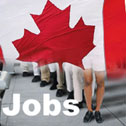 Security and protection against both natural disasters and such “man-made” disasters as Islamist (or other) terrorist attacks (remember Timothy McVeigh?) remain increasingly important in the post 9/11 universe, even in a geographically vast but still thinly populated new country like Canada (that no one can accuse of being any kind of global empire).
Security and protection against both natural disasters and such “man-made” disasters as Islamist (or other) terrorist attacks (remember Timothy McVeigh?) remain increasingly important in the post 9/11 universe, even in a geographically vast but still thinly populated new country like Canada (that no one can accuse of being any kind of global empire).
But Karl Marx was right about one thing at least in the modern world. In the very end, it is still the economic base that counts the most. And it was not nice to read on September 8, 2006 that “Canadian employers unexpectedly shed 16,000 jobs in August, the third month in a row of declines … It’s the first time since 1992 the country has shed jobs for three straight months … The weaker-than-expected report raised the chance that the Bank of Canada may eventually cut interest rates … The central bank this week left its key lending rate unchanged at 4.25 per cent.”
At least the Toronto financial community (and the Toronto Stock Exchange, or “TSX”) is also apparently somewhat concerned these days by increasing numbers of symbolic signs that read “For sale: Corporate Canada.”
 Especially now that the West is in, in Ottawa, at last, this may not be such a worry in other parts of the country. And whether it means anything at all for Canada’s continuing viability as a real country of the future seems, contrary to another set of deductions someone might make from the writings of Karl Marx, open to vast questioning at least. As the old Central Canadian financial guru Tom Kierans has explained, the issue needs study, particularly in terms of its impact on careers, incomes, and Canada’s standard of living: “It’s too damn complex to be smart about.”
Especially now that the West is in, in Ottawa, at last, this may not be such a worry in other parts of the country. And whether it means anything at all for Canada’s continuing viability as a real country of the future seems, contrary to another set of deductions someone might make from the writings of Karl Marx, open to vast questioning at least. As the old Central Canadian financial guru Tom Kierans has explained, the issue needs study, particularly in terms of its impact on careers, incomes, and Canada’s standard of living: “It’s too damn complex to be smart about.”
Meanwhile, it is becoming increasingly clear that one old part of Corporate Canada really will never be the same again: “Conrad Black’s personal finances keep getting more complicated … First, an Ontario judge issued a freeze order last month tying up Lord Black’s assets worldwide and putting him and his wife, Barbara Amiel Black, on a $50,000-a-month allowance …
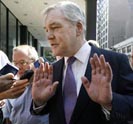 “Now, court filings in Chicago allege Lord Black has failed to make payments on a $10-million (US) loan and faces an interest rate of 26.5 per cent because the mortgage is in default … Yesterday [September 7], US prosecutors demanded Lord Black immediately pay off the loan, plus accrued interest, or risk being in violation of his bail conditions. But even they acknowledged in a court filing that Lord Black can’t make the payments until he gets the Canadian freeze order lifted or modified.” To be continued, no doubt …
“Now, court filings in Chicago allege Lord Black has failed to make payments on a $10-million (US) loan and faces an interest rate of 26.5 per cent because the mortgage is in default … Yesterday [September 7], US prosecutors demanded Lord Black immediately pay off the loan, plus accrued interest, or risk being in violation of his bail conditions. But even they acknowledged in a court filing that Lord Black can’t make the payments until he gets the Canadian freeze order lifted or modified.” To be continued, no doubt …
One last piece of recent high-end Canadian economic news leaves everything on a somewhat more optimistic note: “Bank of Montreal’s slow but steady march into the Chinese financial sector has earned it another high-profile investment banking assignment, this time as a co-manager on China Merchants Bank’s impending $2.7-billion (US) initial public offering …
 “With China’s financial industry poised to face more foreign competition by the end of the year, its banks are rushing to the public markets with a flurry of huge IPOs, raising tens of billions of dollars from investors who want an easy way to profit from the country’s economic growth …
“With China’s financial industry poised to face more foreign competition by the end of the year, its banks are rushing to the public markets with a flurry of huge IPOs, raising tens of billions of dollars from investors who want an easy way to profit from the country’s economic growth …
“So far, BMO is the only Canadian bank that has played a role in these offerings. It … is expected to be angling for an even bigger prize next month: a chance to be part of the highly anticipated IPO for Industrial and Commercial Bank of China, which some industry observers expect could fetch as much as $19-billion, making it the largest stock offering in history.”
(I must check and see just how much money is in my own alas so much more modest BMO account, very soon – once all the navel-gazing about 9/11 Five Years Later has come to an end.)

